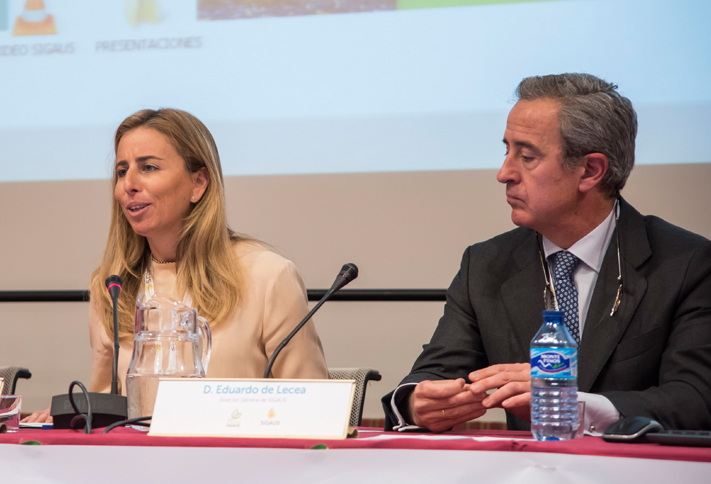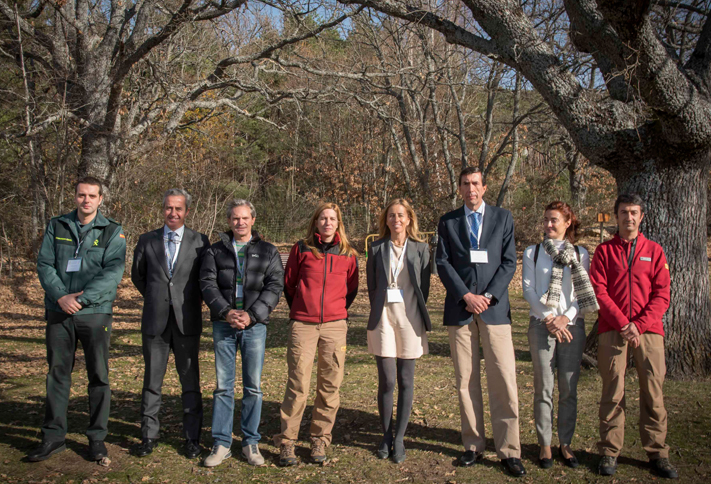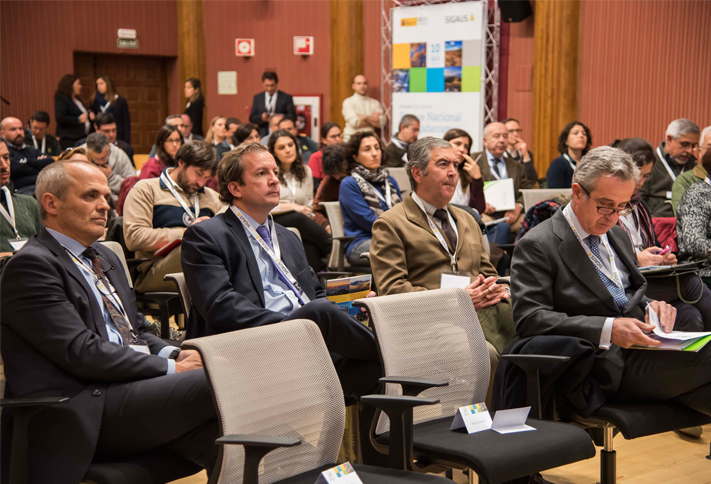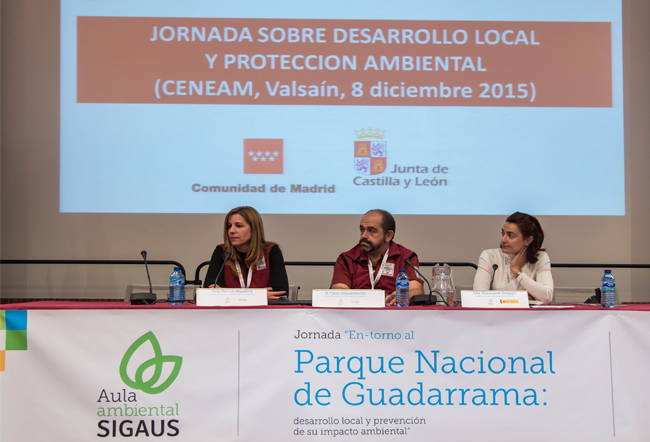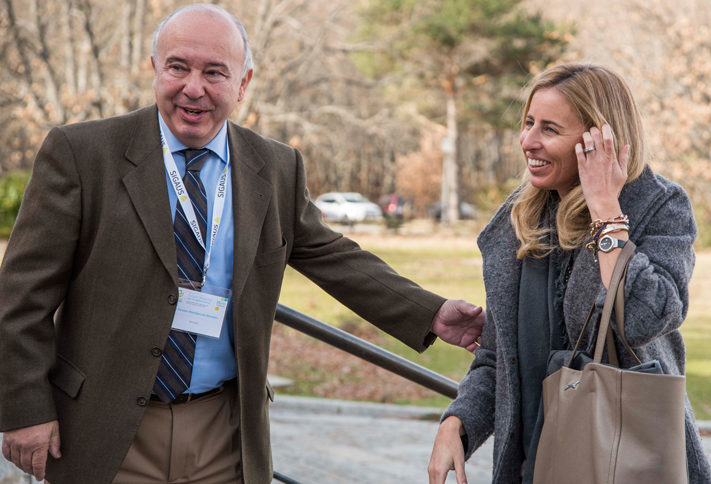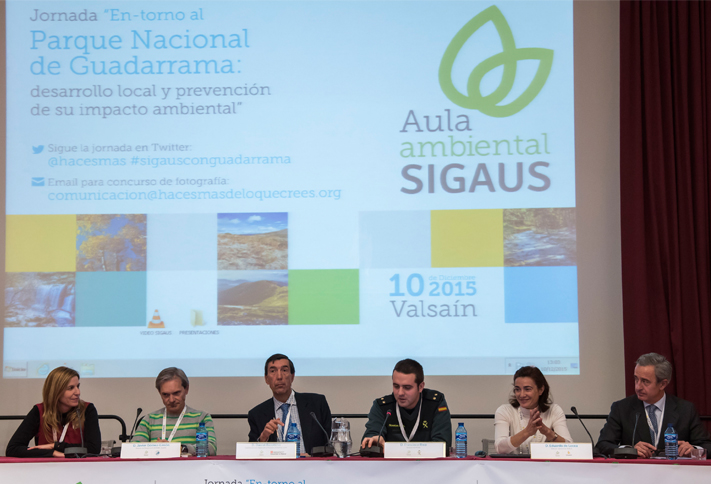49. Cabecera noticia Aula Ambiental
MAGRAMA shows its support for the "Aula Ambiental SIGAUS" (SIGAUS Environmental Hall) in its première at the Sierra de Guadarrama National Park
The Ministry of Agriculture, Food and Environment (MAGRAMA) explicitly supported the new awareness and training project of SIGAUS, the "Aula Ambiental SIGAUS" during its opening day on 10 December at the headquarters of the National Environmental Education Centre (CENEAM). This initiative was also supported by the National Parks Autonomous Agency (OAPN). Public Administrations, SEPRONA, producers of waste oils, waste managers and civil society also gathered around the importance of combining local development with the conservation of natural spaces, where the management of industrial waste oil plays a key role.
14-12-2015
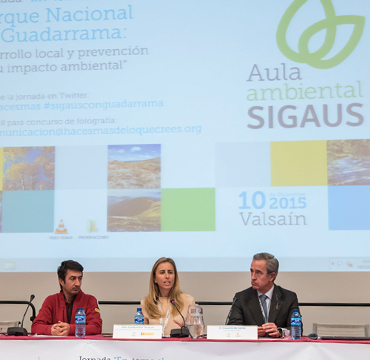
24. Párrafo noticia Aula Ambiental
Entitled "On the Guadarrama National Park: local development and prevention of environmental impacts", the "Aula Ambiental SIGAUS" pulled off in Valsaín, Segovia, at the Guadarrama National Park, with the assistance of more than one hundred participants, including representatives of MAGRAMA, the Autonomous Community of Madrid and of Castilla y León, entrepreneurs, local development organizations, ecologists, managers, environmental protection agents, as well as a broad representation of the City Councils and industrial sectors of the area.
Throughout the morning, speakers such as the Deputy Director General of Waste of MAGRAMA, Maria José Delgado, the Co-directors of the National Park, Patricia Riquelme and Pablo Sanjuanbenito, Deputy Director General for Inspection and Environmental Discipline of the Community of Madrid, Daniel Barettino, the SEPRONA lieutenant, Francisco Rico, and the Head of Projects for the Europarc Spanish Network, Javier Gómez-Limón, shared their experience in environmental management, sustainable tourism and protection of areas of high ecological value such as the Sierra de Guadarrama, accompanied by the General Manager of SIGAUS, Eduardo de Lecea and the Director General for Quality and Environmental Assessment and Natural Environment of MAGRAMA, Guillermina Yanguas, who closed the Day.
“Only considering rural areas, in 2014, SIGAUS collected industrial waste oil from 1,224 municipalities located next to the nationally or internationally protected natural spaces", Eduardo de Lecea recalled in his speech, in which he said that these collections represented a total of 10.1 million kg of waste oil, nearly 7,500 producers attended, and average displacements for treating waste exceeding 100 kilometres.
In this line, during the Day, today's difficult situation on the collection system of industrial waste oils and the challenge to sustain this management which is heavily dependent on the international situation of oil was addressed, given that products manufactured from waste oil, both regenerated base and fuel, compete with other similar ones obtained from first oil refining.
“When oil is cheap, as it is now, there is lower demand for these products, and the industry and management are seriously endangered, affecting the weakest points in the management chain, such as that of collection in rural areas or regeneration itself, a preferential treatment at the environmental level, but also the most expensive, as it is performed in smaller refineries which require large investments" Eduardo de Lecea recalled.
32. Contenido noticia Aula Ambiental
“
En his presentation, Eduardo de Lecea claimed that SIGAUS will stil guarantee the waste oil collection, in a moment in which petroleum is cheaper and, therefore, the products that result from waste oil are less competitive, a situation that requires a higher economic effort to SIGAUS.
„
New challenges, new opportunities
Meanwhile, Guillermina Yanguas, positively valued the initiative of "Aula Ambiental SIGAUS", because "training and knowledge are essential, even more so in the environmental protection field", and she pointed out during the closing ceremony that this type of encounter "is key to give greater prominence to the waste sector and to move towards this necessary change to Circular Economy for the efficient utilization of resources contained in waste".
Furthermore, she found that the challenges that lie ahead in this field are also "new opportunities for growth and jobs to increase competitiveness in our economy and to further progress in improving waste management", which is essential, even though, as it occurs with industrial waste oil, "collection levels are very high". In this regard, she stressed the importance of joint cooperation between all social agents, citizens, Public Authorities and integrated management systems, which she considered "allies" on this challenge.
After the close of the meeting, attendees enjoyed a guided route around the Valsaín Forest, accompanied by CENEAM monitors, and Spanish wine made from local products of organic origin.
